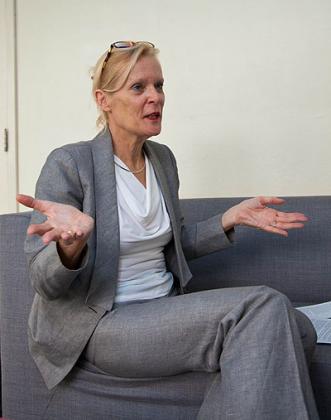Leon Cuelenaere is the ambassador of the Kingdom of The Netherlands to Rwanda. The country best known for land reclamation and one of the leading exporter of agriculture produce. Cuelenaere believes that Rwanda’s economic ambition will best be achieved through sector diversification and taking full advantage of cross-border trade. She shared with Business Times’ Peterson Tumwebaze on these issues and the role her government is playing in supporting Rwanda’s growth strategy


Leon Cuelenaere is the ambassador of the Kingdom of The Netherlands to Rwanda. The country best known for land reclamation and one of the leading exporter of agriculture produce. Cuelenaere believes that Rwanda’s economic ambition will best be achieved through sector diversification and taking full advantage of cross-border trade. She shared with Business Times’ Peterson Tumwebaze on these issues and the role her government is playing in supporting Rwanda’s growth strategyWhat role is the Dutch government doing in supporting the economic development of Rwanda?Our role is to be a long-term development partner, who will play a key role in ensuring that the country becomes prosperous and self-reliant. You can clearly see this through the country’s growth blueprint, EDPRS II. My country has a lot to benefit from Rwanda’s prosperity. Is this plan not too ambitious given the time framework?If you are not ambitious you will never get anywhere. It’s good for Rwanda to have an ambitious plan, which I believe they will deliver. Remember, the country’s economic growth is so far between 7 and 8 per cent, which is more than that of The Netherlands. This means that the country is on the right track.What lessons can Rwanda borrow from The Netherlands to enable it to attain the targeted 11.5 per cent annual growth? There is need for the country to diversify the economy and expand the export sector base. Yes the service sector is good, but you need to diversify the export-oriented sectors to boost foreign exchange receipts.The Netherlands, just like Rwanda, is a small country with limited natural resources, including land but that has not stopped us from being the leading exporter of horticulture. Rwanda can take the advantage of its fertile soils and conducive climate to become an agro-exports hub.My government is and will continue supporting Rwanda’s export growth plans, not necessarily in terms of access to European markets, but also linking it with other markets. Rwanda can also take advantage of the huge market in Africa and the East African Community present.We want to work with Rwanda on a project to export vegetables, and we are also interested in mining and tourism sectors.We are encouraging more Dutch companies to come and invest in Rwanda. This we believe will have a huge impact on the export industry. Otherwise, we will continue to invest in Rwanda because of the excellent business environment.Some experts are arguing that Rwanda is attracting ‘small’ investors?It does not matter whether they are ‘small’ investors or big. As long as they come in large numbers, they will definitely create an impact. However, our strategy is to encourage big Dutch firms to come and invest here.You have shown a lot of interest in the energy sector, investing 33.9m euro. why?This is part of our long-term strategy with the government of Rwanda. Besides, for Rwanda to develop energy will play a key role; you can’t do business without electricity.However, government should also emphasise renewable energy because our policy has always been never to sacrifice the environment in favour of development. I am sure Rwanda has a plan to safeguard the environment and ensure sustainable development. Remember, if you don’t take good care of the environment, you pay a heavy price later.We will continue to support Rwanda to become a prosperous and self-reliant nation.


